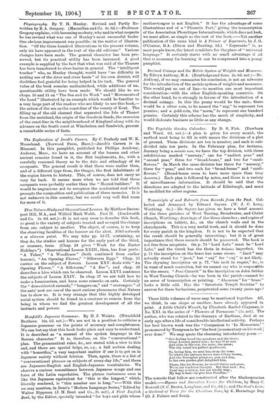Hossfield's Japanese Grammar. By H. J. Weintz. (Hirschfeld Brothers. 10s.
6d. net.)—We are not in a position to criticise a Japanese grammar on the points of accuracy and completeness. We can but say that this book looks plain and easy to understand. It is described as "a manual of the spoken language in the Roman character." It is, therefore, on the " conversational " plan. The grammatical rules, &c., are stated with a view to this end, and there are special helps, as, e.g., a full section dealing with " honorifics," a very important matter if one is to get on in Japanese society without friction. Then, again, there is a list of "conversational phrases on subjects of every-day life," and there are Japanese-English and English-Japanese vocabularies. We observe a curious resemblance between Japanese usage and one form of the Latin superlative. The phrase iustissimus anus is like the Japanese equivalent for "this is the longest," which, literally rendered, is "this number one is long."—With this we may mention, in Dent's "Modern Language Series," Edited by Walter Rippman (J. M. Dent and Co., 2s. net), A First English Book, by the Editor, specially intended "for boys and girls whose mother-tongue is not English." It has the advantage of some illustrations and of a "Phonetic Part," giving the transcription of the Association Phonetique Internationale, which does not look, we must allow, as simple as the rest of the book.—Yet another publication of the same kind is A Primer of Esperanto, by J. G. O'Connor, B.A. (Dixon and Hunting, ld.) " Esperanto " is, as most people know, the latest candidate for the place of "universal language." It certainly starts with no small advantage if all that is necessary for learning it can be compressed into a penny pamphlet.


































 Previous page
Previous page